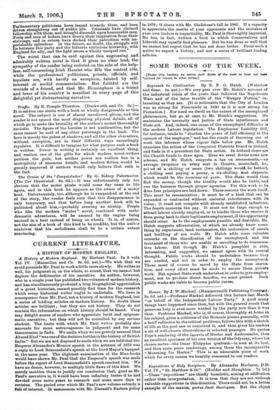CURRENT LITERATURE.
A HISTORY OF MODERN ENGLA.ND.
A History of Modern England. By Herbert Paul. In 5 vols. Vol. IV. (Macmillan and Co. 8s. 6d. net.)—We wish that we could persuade Mr. Paul to work a little more slowly. He writes so well, his judgment is, on the whole, so sound, that we cannot but deplore the deficiencies of his narrative. An author, however, who in a single year has published two volumes of modern history, and has simultaneously produced a long biographical appreciation of a great historian, cannot possibly find time for the research which every historical writer ought to undertake. We have in consequence from Mr. Paul, not a history of modern England, but a series of leading articles on modern history. No doubt these articles are brilliant ; but they are not history. They do not contain the information on which history should be based. They may delight scores of readers who appreciate lucid and epigram- matic narrative ; but they will not be consulted by any serious student. The haste with which Mr. Paul writes probably also Recounts for some extravagances in judgment and for some inaccuracies in facts. We smile when we are gravely assured that Ahmed /1 hel "was one of the decisive battles in the history of British India." But we are not disposed to smile when we are told that the Emperor Alexander's Moscow speech in the autumn of 1876 was a reply to Lord Beaconsfield's speech at the Lord Mayor's banquet in the same year. The slightest examination of the Blue-books would have shown Mr. Paul that the Emperor's speech was made before the report of Lord Beaconsfield's speech reached him. We have no desire, however, to multiply little flaws of this kind. We merely mention them to justify our conclusion that, good as Mr. Paul's narrative is, it would have been infinitely better if he had devoted some more years to research and some more days to revision. The period over which Mr. Paul's new volume extends is full of interest. It commences with Mr. Disraeli's Eastern policy
in 1876; it closes with Mr. Gladstone's fall in 1885. If a capacity to appreciate the merits of your opponents and the mistakes of your own leaders is impartiality, Mr. Paul is thoroughly impartial. He has, in fact, written a book in which Conservatives and Liberals may equally find pleasure. But he has done so well that we cannot but regret that he has not done better. From such a writer we expect a history, and not a series of brilliant leading articles.














































 Previous page
Previous page